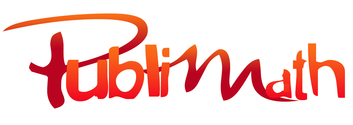History and Epistemology in Mathematics Education. What history training for future mathematics teachers? Personal experiences and reflections. p. 26-47.
(Quelle formation en histoire pour les futurs professeurs de mathématiques ? Expériences personnelles et réflexions.)
Une version texte intégral est en téléchargement sur le site Bibliothèque numérique des IREM et de l’APMEP Télécharger
Auteur : Tournès Dominique
Résumé
L’auteur présente sa manière de former les futurs enseignants à l’utilisation de l’histoire dans la formation mathématique des élèves. La stratégie recommandée comprend trois composantes en interaction constante : Abstract In this paper, I present my way of training future teachers in the use of history to im-prove students’ mathematical learning. The strategy that I recommend includes three components in constant interaction. First of all, there is the manipulation of artefacts that the teacher can use in a process of semiotic mediation to favour the appropriation of the mathematical knowledge embedded in these objects. This importance given to gestures, procedures and instruments is reinforced by an opening towards ethnomath-ematics. Secondly, there is the study of short original texts taken mainly from six major works covering almost completely the contents of secondary education. This study is done in close connection with specific curriculum items and the conception of scenarios for the classroom. Finally, the future teachers are responsible for design-ing pedagogical sequences inspired by history and experimenting with them in their classes during the internships. This devolution phase, which is the subject of didactic analyses, seems to me essential for a sustainable integration of the training’s achievements. The main objective of this triptych of activities is not to train future teachers in history, but to train them in the teaching of mathematics by deepening their knowledge of the discipline on the cultural, epistemological and didactic levels.
– la manipulation d’artefacts que l’enseignant peut utiliser dans un processus de médiation sémiotique pour favoriser l’appropriation des savoirs mathématique attachés à ces objets. L’ethnomathématique offre un cadre intéressant ;
– l’étude de courts textes originaux tirés principalement de six ouvrages majeurs couvrant presque entièrement les contenus de l’enseignement secondaire, avec la conception de scénarios pour la classe ;
– enfin, les futurs enseignants conçoivent des séquences pédagogiques inspirées de l’histoire et les expérimentent en classe lors des stages.
Notes
Chapitre des Actes de la neuvième université d’été (ESU 9)
Données de publication
Éditeur Edizioni Nuova Cultura Rome , 2023 Format p. 26-47 Index Bibliogr. p. 46-47
ISBN 88-3365-601-2 EAN 9788833656014
Public visé chercheur, enseignant, formateur
Type chapitre d’un ouvrage Langue anglais Support papier
Classification
